Here you will encounter a history of my spiritual reading.
Well, that sounds tedious. I acknowledge that most people probably won’t even want to read it.
When St. John Bosco was preparing to enter the seminary to study for the priesthood, he reflected on the fact that, although he had not led a necessarily sinful life, he had wasted it in “vain pastimes” and desired to have a more stable way of life that was more fitting with the dignity of the priesthood. Consequently, he wrote seven resolutions, one of which was:
"I have in the past served the world through profane readings and I shall in the future strive to serve God by reading spiritual material."
I appreciate his sentiment here, and I believe a similar desire grew within my heart regarding the kinds of books I was choosing to expose myself to. I started off being entirely worldly and spiritual works came into my life gradually. Over time, the secular gave way to the spiritual.
Reading is part of my family culture, a culture that I was born into, and a culture which I preserved and secured for my own children.
My grandparents were voracious readers. My parents were voracious readers. I became a voracious reader. And now my children are voracious readers.
My mother homeschooled my brother and me, so not only was our home full of books, but trips to the library were a frequent and normal part of life. I had stacks of books on my bed. I had stacks of books on the side tables in the living room. I had stacks of books next to the heater where I would sit, wrapped in a blanket, reading. Much like this painting above, I have many memories of long afternoons absorbed in a book with a cat close by.
St. Thérèse of the child Jesus wrote:
“I wasn't too good at playing games, but I did love reading very much and would have spent my life at it. I had human angels, fortunately for me, to guide me in the choice of the books which, while being entertaining, nourished both my heart and my mind. And I was not to go beyond a certain time in my reading, which was the cause of great sacrifices to me as I had to interrupt my reading very often at the most enticing passage. This attraction for reading lasted until my entrance into Carmel. To state the number of books that passed through my hands would be impossible, but never did God permit me to read a single one of them that was capable of doing me any harm.” - St. Therese, Story of a Soul, Chapter IV
I wish, like St. Thérèse, that I could say that God never permitted me to read a single book capable of doing me harm, but not so was the will of God in my regard. In my childhood, I can only remember reading secular books and whatever classics I was assigned for school. You could just as likely find me reading Calvin & Hobbes as you could find me reading Dickens or Shakespeare.
It’s true that my mom had pretty high standards regarding the quality of our books. There was almost no twaddle allowed in our Charlotte Mason homeschooling household (I was never allowed to check out Captain Underpants from the library.) Instead, I was fascinated by tales of the mysterious Roanoke, I cherished a beloved biography of Mozart, and somehow, I never got tired of venturing into Wonderland with Alice or Neverland with Wendy. I remember the first book that made me cry, Where the Red Fern Grows. And the book that never failed to make me laugh no matter how many times I read it, Winnie-the-Pooh.
The only religious book I remember reading in my childhood was The Baltimore Catechism, which I had to study and memorize. I must have read a biography of St. Catherine of Siena at some point, because tucked away in my folder of old school papers is a book report about her. But whatever scanty selection of religious books I may have read as a child, I can’t remember them, so they mustn’t have made much of an impression on me.
As a teenager and young adult, I gobbled up whatever was popular at the time. I read books like Girl with a Pearl Earring, The Secret Life of Bees, My Sister’s Keeper, The Lovely Bones, Memoirs of a Geisha, The Book Thief, and other “best sellers.” I went through a phase where I couldn’t get enough of dystopian worlds and I stayed up far too late into the night binge reading series like The Hunger Games, Divergent, and the Giver quartet.
When it was time for my Confirmation, I was told to choose a Confirmation Saint. I had no idea who to choose, but I eventually settled on St. Teresa of Avila. I learned that, in her youth, she had an inordinate passion for worldly books. She recounts in her autobiography that her mother was very fond of “books of chivalry” and had a library full of them. To the annoyance of their father, Teresa and her siblings would be left alone to occupy themselves with long hours of reading in the library. She wrote:
“I contracted a habit of reading these books; and this little fault which I observed in my mother was the beginning of lukewarmness in my good desires, and the occasion of my falling away in other respects. I thought there was no harm in it when I wasted many hours night and day in so vain an occupation, even when I kept it a secret from my father. So completely was I mastered by this passion, that I thought I could never be happy without a new book.”
Something inside my soul must have stirred. My conscience was pricked a bit. I knew I was guilty of the same. I remember so clearly thinking, “If she was able to recognize her lukewarmness and eventually become fervent, maybe I can, too.” For this reason, I took her as my Confirmation Saint. It’s almost laughable to me now, to look back on that moment in which I recognized my own tepidity, and I acknowledged a need to change, and yet I did nothing to actually change.
When I became a parent, I read an exhaustive list of parenting books, all secular in nature.
At some point, I devised a reading plan that contained all the books that the animated Disney films had been based on, and I read them in the same order that Walt Disney released them (books like Pinocchio, Bambi, One Hundred and One Dalmatians, The Sword in the Stone, The Jungle Book, etc.; naturally this became a bit more heavy and tedious as I came to books like Robin Hood, Oliver Twist, and The Hunchback of Notre Dame…)
Another time, I decided to tackle all the “girl books” that I never read as a child because I had been such a stubborn tom-boy who refused to touch “feminine books” such as Little Women, Anne of Green Gables, Heidi, and Pollyanna.
Yet another time, I made a reading list based on great classics that I had never read previously, probably due to their length or adult themes. This consisted of books like Les Miserable, Jane Eyre, and The Count of Monte Cristo.
I always had a book in my hand, or bag. All my spare moments were filled with reading.
Although I could boast of being well-read, it was entirely worldly. I wasn’t reading anything spiritual or religious in nature.
It wasn’t until I was in my early twenties that I realized the importance of spiritual reading and that I could (and should) channel my insatiable reading habits toward something profitable for my soul.
I was 25 years old when I first began spiritual reading.
WARNING: My launching point into spiritual reading is going to offend the Trads among us. I’m so sorry, Trads. I have to speak the truth, and I can’t change the fact that my first steps into a deeper spiritual life were through modern, controversial saints. Regardless of the material, there was within my soul a desire and intention that was rightly ordered, and God saw fit to reward that desire and intention by permitting it to bear good fruit.
The first “spiritual book” I read was a meditational series called In Conversation with God by Fr. Francis Fernandez. These books contain daily readings and meditations structured around the liturgical year (the Novus Ordo calendar, as I had not yet attended a Latin Mass). If I’m not mistaken, this priest is associated with the Opus Dei, and, well, whatever you might think about the Opus Dei, the fact remains that this series was my first taste of spiritual reading. At the time, I found it immensely helpful in beginning to structure my life around the liturgy. We all have to start somewhere, and this was my gateway.
I read Friends of God, which are homilies by St. Josemaría Escrivá. This had a major impact on me because of what he said about sanctifying ordinary work. Now, Escriva is hardly the first to preach this — (if there is one thing I’ve learned after reading dozens of spiritual books, it’s that saints and theologians simply repeat what the saints and theologians before them said) — but it was the first time that I was personally exposed to this idea of being “sanctified through the ordinary.”
Escriva considered it madness to want to change your place in the world, as if by simply doing so one could become holy. On the contrary, he insisted that we find holiness in the ordinary lives that we live in the world. At the time, I was struggling to understand how the vocation of marriage could be “holy” when holiness, for me, conjured up images of monks and nuns secluded in monasteries, living lives of constant prayer. How is being a wife and mother holy? I couldn’t see it, but Escriva was opening my eyes. I began to see how it is not the actions themselves that constitute holiness, but the love with which our actions are done that determine its value. I began to see that the supernatural value of our lives isn’t dependent on accomplishing things, but rather it is found in the faithful acceptance of God's will and generously accepting all the little opportunities for daily sacrifices.
Now please allow me to make an even BIGGER kerfuffle.
I tried to read Faustina’s diary, but I found it too tedious. So, I read The Life of Faustina Kowalska instead, which was so much more approachable and easier to read. Again, regardless of what you think of her, I found Faustina to be inspirational. Here is what I wrote about the book after I finished it:
Despite her constant and terrible sufferings, she never ceased to offer her pain for the conversion of sinners. She desired nothing more than to be united with God's will, and for souls to be saved through God's infinite and unfathomable mercy. She accepted whatever suffering He saw fit to send to her, especially if it benefited other souls. She even asked for her suffering to increase if it meant that more souls would be saved. Despite the great suffering she endured, she never lost her joy. She could not help but be joyful, as her soul delighted so much in loving Jesus and being loved by Him.
There were two big things I took away from this biography that improved my spiritual life:
Faustina desired for her heart to become a dwelling place for Jesus alone, for nothing else to occupy it. She referred to her heart as a "repose,” a place for Jesus to rest, like a beautiful garden where Jesus could dwell continuously. This really flipped how I viewed the Eucharist. Previously, I had always received the Eucharist expecting to get something; it had never occurred to me that I could desire to give something, this concept of being generous to God. I wanted so much for my heart to be a place of repose where Jesus could enter and find rest.
Faustina had a great love and devotion for Christ in the Eucharist, stating that "all that is good in me is due to Holy Communion" and "all the strength of my soul flows from the Blessed Sacrament." In this way, she became my inspiration to attend daily Mass and receive the Eucharist daily. It was because I read this book that I began to attend Daily Mass, a practice I was able to keep up for the next 4 years.
Next, I tried to read The Imitation of Christ, but I wasn’t ready for it. I was struggling to understand what I was reading, so infantile was my knowledge of anything spiritual. This book was simply too lofty for me.
I also tried to read Story of a Soul, but nothing resonated with me at all, and I ended up walking away from that one thinking that I didn’t like St. Therese (don’t worry, I love her now, but that comes later).
Instead, I tried Interior Castle by St. Teresa of Avila. Again, it was way over my head. Since St. Teresa is my confirmation saint, I was so hoping that I would glean something wonderful from her writings, but I walked away feeling stupid.
I was going to take a long road trip to my parent’s house. I had three small children with me, but my husband was deployed, so I wanted an audiobook to keep me entertained on the long drive. I decided to go to a local Catholic bookstore and see if they had any Catholic audiobooks I could listen to.
I didn’t find an audiobook per say— but I did find an audio recording that was a selection of the writings of St. Bernard of Clairvaux, with explanations and commentary.
This was extremely beneficial for me. St. Bernard’s writings were my first exposure to the idea of the spiritual life progressing through “stages.” Traditionally, they are known as the Purgative Way (of the beginner), the Illuminative Way (of the proficient), and the Unitive Way (of the perfect). But Bernard had a unique way of describing these stages which he called “the kiss of the feet,” “the kiss of the hand,” and finally, “the kiss of the mouth.” He described how one begins the spiritual journey in a state of contrition and repentance, kissing the feet of Jesus. His description of the conversion process of a repentant sinner was spot on. My heart stirred as I recognized myself in the words of a 12th-century monk. I got goosebumps as I realized I had entered on the right path. He talked about the “imperfect love” of these beginners who come to the feet of Christ in repentance with selfish motives, that is, a fear of punishment and hell. But he talked about how, as one progresses, they come to a “perfect love,” where God is simply loved for who He is, not because of servile fear or because of the gifts He gives. I knew my love of God was imperfect and mingled with my selfish motives, but I desired to love God more purely. I saw how I was only at the beginning of this “spiritual life,” and I still had a long road of purification ahead.
St. Bernard emphasized that one cannot go from the feet of Christ to the hand by themselves, because it is the hand of Jesus that lifts us up. I knew, deep in my soul, that I wasn’t “there” yet. I knew that I was still attached to sin, that I had a lot to do to overcome my vices, and that I had never really made the effort to cultivate virtues before…
All this new spiritual reading was producing fruits in my soul. I had a greater longing for God. The desire to be a saint was growing inside of me, even if I was well-aware of the great chasm that existed between myself and the saints.
Soon, I sought out the Latin Mass, and it was there that I began hearing traditional homilies and being fed spiritually in a way that I hadn’t been in the previous 26 years of my life. One such homily was an explanation of the parable of the Good Samaritan, an explanation I had never heard before, one that validated the truth of Catholicism through symbolism. Inspired by this homily, I found a little gem of a book called Divine Parables Explained by Fr. Prachensky. I was fascinated by the explanations of the parables.
I began to realize there was a whole, big, beautiful treasury of tradition in the Church, of which I was now barely beginning to skim the surface.
2015
Insert the birth of my 4th child.
I had a tradition of taking a very big book to the hospital with me when I gave birth, knowing that my husband would leave soon after the birth (to be at home with the other children), and I would spend the next 24 hours alone in a hospital room, nursing a newborn baby. A ridiculously long novel was a necessity to pass the time.
For this 4th delivery, I chose Lloyd C. Douglas’ 528-page novel, The Robe, to accompany me to the hospital. It’s a historical fiction story about the Roman soldier who won Christ's robe when they are casting lots for His garments.
That year, I read a lot of books about homeschooling, housekeeping, the food industry, and minimalism — but I also made time for some spiritual books:
Life of Christ by Fulton Sheen
A Mother’s Rule of Life by Holly Pierlot
Holiness for Housewives by Hubert Van Zeller
Sins of the Tongue by Fr. Belet
A Man of the Beatitudes by Luciana Frassati
At the time, I thought “Life of Christ” was one of the best books I had ever read. I even wrote a note stating that I would make it required reading for my children when they were old enough.
The priest who brought my husband into the Church and baptized our fourth baby recommended the book “Treasures and Traditions: The Ultimate Guide to the Latin Mass,” so we purchased that. It’s fantastic and I highly recommend it!
2015 was a very hard year for me. The transition from 3 to 4 children was not a smooth one for my mental health. I started to suffer from crippling anxiety attacks. Because of this, I began to pursue what I called “a simple life.” Although I meant that in an entirely worldly way, it was this seeking of simplicity that led me to the secular practice of minimalism which, in turn, led me to discover the Catholic virtue of detachment.
Previously, I had never been exposed to this virtue. Discovering it was a much needed “aha!” moment in my life, as this virtue is as fundamental to holiness as is charity and humility. This is what inspired me to start my Instagram account, Poor in Spirit, in which I desired to share what I learned about the virtue of detachment.
2016
When the New Year dawned, I decided that I would make a structured reading list to tackle. That year I read:
The Secret Diary of Elisabeth Leseur
Atheist Delusions by Hart
Seven Deadly Sins by Kevin Vost
The Four Last Things by Fr Martin Von Cochem
Marriage and Parenthood by Rev. Thomas J. Gerrard
Saints Who Battled Satan by Paul Thigpen
Inside the Bible by Kenneth Baker
Biblical Roots of the Mass by Tom Nash.
For some reason, I really gravitated toward apologetics books, especially ones that refuted atheism. My husband and I started collecting Trent Horn books. I didn’t read them all in a single year, but the books written by Horn that we purchased and read were:
Answering Atheism
Persuasive Pro-Life
Why We're Catholic
Hard Sayings
The Case for Catholicism
2017
In 2017, I joined an online Catholic book club hosted by a Catholic author, and I read whatever books were on the schedule that she provided. We read:
He Leadeth Me by Walter Ciszeck
Catherine of Siena by Sigrid Undest
Happy Are You Poor by Thomas Dubay
Into Your Hands by Wilfrid Stinissen
All of these were truly excellent books that left lasting impressions on me, books that were so good I would re-read them later.
I was reading plenty on my own, too. I read God or Nothing by Cardinal Sarah, and I borrowed The Power of Silence from a friend which I regularly took into the silence of the Adoration Chapel.
I was becoming increasingly interested in theology and desiring to read the Summa, but I contented myself on reading the works of Peter Kreeft, which provided easier explanations of the Summa. My husband bought me Practical Theology: Spiritual Direction from Saint Thomas Aquinas for Christmas, which was my first taste of the Summa.
I’ll never forget when I attended a women’s Bible study where, at some point, I had quoted from the Summa. A woman there asked me why I had read the Summa, thinking it was for school. I told her I like to read it sometimes “just for fun.” I barely remembered that conversion, until sometime later when I went to an event hosted at her home. There was a deacon present, and this woman was obviously excited to introduce me to the deacon. To my surprise and embarrassment, she introduced me as “a great theologian.” And added, “She reads the Summa for fun!” A good friend of mine witnessed the exchange and still loves to tease me about what a great theologian I am. :)
Anyway, I was also reading some little paperbacks that packed powerful punches despite their small size:
Spiritual Life in the Modern World by Fr. Hardon
Searching For and Maintaining Peace by Jacques Philippe
Where We Got the Bible by Henry Graham
(I highly recommend all three of these)
2017 was also when I went through my heavy Tolkien phase. I had read the entire Lord of the Rings trilogy aloud to my children, and afterward I became deeply interested in Tolkien himself. First, I read a couple of biographies of his life, then I moved on to books that were about the spirituality “hidden” in his works, mostly authored by Joseph Pearce.
2018 and 2019
I decided to start hosting a book club of my own, inviting Catholics from my church to come meet in my home. To my surprise, it was well attended! Once a week, I would cook dinner for everyone, and we would spend the evening discussing a book. There was a gentleman in the group who actually was going to school for a degree in Theology, so we tended to sort of let him choose books and turned to him for guidance us. In fact, we initially called ourselves a “Theology Group” until the priest at our church started coming to our get-togethers. Hilariously, after observing a few of our meetings, he demoted us to “Book Club.”
Together we read:
The Lamb's Supper by Scott Hahn,
Angels and Demons by Peter Kreeft,
The Old Evangelization by Eric Sammons
The Benedict Option by Dreher
The Case for Jesus by Brant Pitre
The Four Last Things by Cochem.
Meanwhile, I was also part of a Mother’s Group at the church that was reading Story of a Soul together. We used this very helpful study edition. After this reading, I no longer felt like I disliked the Little Flower, but had come to understand her and her spirituality so much better. (I still didn’t fully appreciate her or her writings… that wouldn’t come until later).
By now in this history, it’s time for me to give birth to the twins, and time to choose another book to accompany me to the hospital. This time I chose the 1,000+ page Gone With the Wind.
It turned out that breastfeeding twins gave me more time to read than I had ever had before, due to so many long hours sitting and nursing two babies. But unfortunately, I didn’t utilize this precious time to read spiritual books. Instead, I read whatever e-books I could easily check out from the library on my kindle. I read all kinds of random books based on what was available to check out. Although most of them are not worth mentioning, the most memorable to me were A Long Walk to Water and Unbroken; both intense stories of survival. Enduring extreme sleep deprivation due to newborn twins, survival stories really resonated.
I spent so much time that year sitting in a big recliner, nursing the twins, and I did little else but read. The twins were born toward the end of 2018 - which books were read in 2018 and which in 2019? Who knows. Memories of the first year of their lives is a sleep-deprived blur.
But I do remember some of my favorite books that I read during that time: Death Comes for the Archbishop, Watership Down and Agatha Christie mysteries.
And my least favorite: East of Eden, The Power and the Glory, and Kristin Lavransdatter.
I’m sorry. I know everyone else loves Kristin Lavransdatter, but I didn’t love it.
During this time, I also read:
The Song of Bernadette by Franz Werfel
The Will of God by Fr. Kenneth Baker
In This House of Brede by Rumer Godden
The Sword and the Serpent by Taylor Marshall
Guadalupe Mysteries by Grzegorz Górny
2020
Life took a dramatic turn this year, both physically and spiritually. First, our family moved to a different state, which was a big change in itself. Second, we moved into our new house just weeks before that whole Covid debacle.
So we were in a new place, we didn’t have any friends yet, and the world had “shut down.”
Since I couldn’t really go anywhere or do anything, I decided it was time to retreat into my interior and deepen my spiritual life. I knew that one of the best ways of fostering that growth was to take my spiritual reading to the next level. So, I firmly resolved to wake early — before anyone else in the house — and spend quiet time alone reading and praying.
I started with a morning routine of:
1. One chapter of the Following of Christ (the Imitation)
2. One chapter of Divine Intimacy
3. A portion of Scripture to meditate on. For this I used a book called Behold the Christ: Proclaiming the Gospel of Matthew by Leroy A. Huizenga.
I remember this time so clearly — the darkness and silence of the house in those early mornings, the flickering on of the small lamp in the corner, and the big, blue chair that I would sit in.
he Imitation and Divine Intimacy stimulated my desire for the things of God and strengthened my resolve to combat vice and pursue virtue. After reading, I would move to the table with a notebook and pen to study the Gospel of Matthew. This was a very fruitful time in my spiritual life.
It wasn’t long before I was adding more books to my mornings:
Uniformity With God's Will by St. Alphonsus Ligouri
Trustful Surrender to Divine Providence.
Holy Simplicity by Raoul Plus
Serenity of Heart by St. Francis de Sales
My Daily Bread by Fr. Paone
These books were teaching me a gentle, simple, and trustful conformity to God’s will. I would highly recommend any and all of them.
This is the same time that I became a novice in the Third Order of St. Dominic. In addition to reading My Way of Life, my Chapter advised me to read biographies of Dominican saints as part of my formation. I read:
Saint Dominic by Sister Mary Jean Dorcy
St. Rose of Lima by Mary Alphonsus
The Life of Blessed Margaret of Castello by William R. Bonniwell
St. Vincent Ferrer: The Angel of the Judgment
Praxedes: Wife, Mother, Widow, and Lay Dominican
For Lent, I read:
The School of Jesus Crucified by Fr. Ignatius Carsidon
Characters of the Passion by Fulton Sheen
That year, I also read:
Christus Vincit by Bishop Athanasius Schneider
The Family That Over-took Christ by Rev. Raymond (about the family of St. Bernard)
A Time to Die, a book about how monks die;
From Slave to Priest, a biography of the first Black American priest in the U.S.;
Left to Tell, a memoir of a survivor of the Rwandan Holocaust;
The Lion of Münster, a biography of a bishop who stood up against the Nazis;
Infiltration by Taylor Marshall
The Anti-Mary Exposed by Carrie Gress
Fatima Mysteries by Grzegorz Górny
Three Kings: Ten Mysteries by Grzegorz Górny
I was choosing more and more books of a religious and spiritual nature, and less and less secular books. Little by little the influence of good spiritual reading was pulling me away from the distractions of the world. My soul was developing a taste for things heavenly, and I was less able to tolerate the worldly, which now seemed like a waste of precious and fleeting time.
2021 - 2023
Because we had moved, we had a new church and priest. This meant that we were hearing homilies and receiving advice in the confessional from an entirely new spiritual father. I thrived under the direction of this priest because he preached almost constantly of that double-edged sword so necessary for the spiritual life: hatred of sin and love of virtue. But not only did he encourage us to relentlessly eradicate vice in our lives and to cultivate virtue, he actually gave us practical steps for doing so.
This new church also gave me access to an incredible library. I brought home and read many books.
Here’s what I was reading that year:
The Hidden Treasure by St. Leonard of Port Maurice
The Real Presence by St. Peter Julian Eymard
The Mass by Fr. Joseph Dunney
A Map of Life by Frank Sheed
Difficulties in Mental Prayer by Eugene Boylan
Guidance To Heaven by Fr. Andrew Byrne
The Soul of The Apostolate by Jean-Baptiste Chautard
The Death Camp Proved Him Real by Maria Winowska
Blessed Miguel Pro by Ann Ball
The Miraculous Medal by Fr. Aladel
Pope Saint Pius X by Forbes
When it came time for Lent, our priest recommended that we read from a daily meditational called Toward Easter by Fr. Patrick Troadec. I also read Cross and Crown: Thoughts for Lent and Letter to the Friends of the Cross by St. Louis de Montfort. This trio was an excellent Lenten combination!
At the suggestion of a friend, I bought The Sermons of St. Alphonsus: For All the Sundays of the Year. Each chapter is a sermon from St. Alphonsus based on the Gospel reading for Sunday, spanning the entire liturgical year.
And now I come to one of THE BEST (that is, most fruitful) times of my spiritual reading.
How did I find this book? Why did I randomly order it off Amazon not having any idea what it was or who the author was? I simple don’t know, but “Christ, the Life of the Soul” by Bl. Columba Marmion proved to be one of the most beneficial spiritual books I ever read.
I followed it with The Spiritual Combat by Scupoli.
I followed that with The Sinner’s Guide by Ven. Louis of Granada.
This trio was gold for my soul.
I checked out The Spiritual Life by Fr. Adolph Tanquerey from the church library, and I kept it for a whole year, so often did I reference it and profit from it, and I was so reluctant to return it.
Another random Amazon purchase that proved providential: The Three Ages Of The Interior Life by Fr. Reginald Garrigou-Lagrange. A massive two-volume publication containing a summary of ascetical and mystical theology. Again, why did I order this book? Probably because, thanks to St. Bernard and Fr. Tanquerey, I had become rather enamored with the three spiritual stages, which Lagrange calls the “interior ages.” There were times I thought it was too dense and too difficult, but I pushed through, and I did read both volumes. And I gleaned richly from the harvest.
The next book I read was the End of the Present World and the Mysteries of the Future Life by Fr. Arminjon. I highly recommend this one as well: St. Therese said that reading this book was one of the greatest graces of her life.
That year, I tried to read City of God but struggled too much with it. Nor was I able to stomach the writings of Luisa Piccarreta.
In 2022, I read two important books.
The first is a little novena booklet titled Peace in Suffering. The booklet contains nine days of antidotes in the life of St. Therese, interspersed with her own writings. This little novena booklet is how I finally came to love and appreciate the Little Flower.
The second was Consecration to Mary, a five-week preparation based on St. Louis’ 33-day preparation. This book is very convenient as it has all the prayers, daily meditations, Scripture readings, etc., all in one book. That year, I consecrated myself to Mary on November 27th, the feast of the Miraculous Medal.
At this point, it would appear that I had almost entirely excluded secular books from my life. But not quite. In 2023, I was pregnant and desiring to knit an enormous number of things for the new baby. I decided to listen to a 900-page biography of George Washington on audiobook to keep me occupied while I knit dozens of little baby sweaters (I have no explanation for this choice of book. None.)
I also purchased and read all three volumes of the Summa Domestica by Leila Lawler.
I remember that I had my baby in the middle of the summer, and I remember sitting outside in the glorious, warm sunshine with my newborn while reading a biography of St. John Henry Newman. I felt that I had found a kindred spirit in his writings and inner life.
The dates are fuzzy, but for Christmas one year (2021, I think) my husband surprised me with the 15-volume set, The Liturgical Year, by Dom Prosper Gueranger. I immediately adopted it into my morning prayer/reading time, and I have done so almost daily ever since. It has become a familiar and much-loved companion for my morning prayer time.
The following Christmas he bought me the five-volume set of Fr. Hamon’s Meditations for All the Days of the Year. This, too, became a daily companion that I have now read in its entirety twice.
It was the summer of 2023 that I felt very inspired to replicate a sort of “Silent Retreat” at home (to the capacity that I could, without neglecting my household and motherly duties). I did this toward the end of summer, before we started a new school year. I didn’t go online, didn’t use social media, no texting or phone calls, no socializing. I just stayed home, tended to my duties with great fidelity, and any spare time I found was spent praying and reading.
During that time, I read:
Saint Catherine of Siena by Alice Curtayne
Mademoiselle Lavalliere by Edward Murphy
Damien the Leper by John Farrow
Life of the Curé d'Ars by Alfred Monnin
Bernadette of Lourdes translated by J.H. Gregory
The Life and Legend of the Lady Saint Clare by Fr. Thomas Celano
The Life and Times of Saint Bernard by Morison
Other books I read this year:
Dark Night of the Soul by St. John of the Cross
An Introduction to the Devout Life by St. Francis de Sales
The Spiritual Exercises by St. Ignatius of Loyola
The Mass of Brother Michel by Michael Kent
Preparation for Death by St. Alphonsus Ligouri
Humility of Heart by Fr. Cajetan
Humility by Kempis
Counsels of Perfection for Christian Mothers by Lejeune
The Holy Will of God: A Short Rule of Perfection by Fr. Benoît
How to Pray at All Times by St. Alphonsus Ligouri
On October 8th, 2023, we had our home enthroned to the Sacred Heart. This is a ceremony in which Jesus Christ is enthroned as the King of our home and family. In order to prepare for the enthronement, I read Jesus, King of Love by Fr. Mateo.
But by the end of October 2023, I had fallen into an intense dark night of the soul, marking one of the most challenging spiritual trials I've yet faced. In hindsight, it was clearly a purification, so normal in the spiritual life, but I didn’t grasp that while I was enduring it.
Previously, I had been doing a tremendous amount of spiritual reading that had proved beneficial and consoling. But now, God withdrew those consolations, and I plunged into what felt like a crisis. I couldn’t read anything, as I had a horrible distaste for anything spiritual. Everything had become repulsive to me. Reading. Prayer. Meditation. I couldn’t even focus on Mass. Quite suddenly, I went from having a very vibrant and lively prayer life to darkness and silence. At this point, vocal prayer was impossible, and I thought I was a “failure” because I could no longer recite prayers.
I remembered novena booklet I owned, Peace in Suffering, and I resolved to pray the novena once more, seeking St. Therese's intercession in my time of darkness. However, upon completing the novena, God's silence persisted, and I felt very disheartened by the absence of any perceived graces or comforts.
I was falling into a state of despair, receiving no comfort from God, facing failures at every turn, and doubting my capacity for anything good. I began to have serious temptations against the three theological virtues.
I now know that God was opening my eyes to my own insufficiency— a key element for growth toward union with God. It is only when we know our sins and miseries, and we accept that we are truly unworthy, truly “nothing,” that we can we turn to God with real hope and complete confidence. God was humbling me in a very powerful way, reducing me to what felt like “nothing.” God was shining a bright light on my soul in which I could see all the dirt and smudges; in other words, I was confronted with a mounting sense of my own imperfection. I didn’t know it at the time, but there were two roads open before me: 1) fall into a state of despair at the sight of my incapacity; or 2) accept my incapacity and let it inspire me to surrender to God with tremendous confidence in His power. Unfortunately, I initially persisted on the first road in a state of stubborn self-reliance, which naturally led to discouragement.
“I, too, thought in time of ease that nothing can shake me now; such power and state, Lord, Thy mercy granted me. Then Thou didst turn Thy face away from me and I was at peace no more.” - Psalm 29
I struggled in this state of desolation and despair (passive purification) through the whole winter. My only solace during this time were two books that I forced myself to read despite my utter lack of interest in anything spiritual: ‘The Ascetical Homilies of St. Isaac the Syrian’ and ‘Abandonment to Divine Providence.’ These were the only things that sustained me through the spiritual darkness.
What was I being purified from? Well, during this time I realized how I had constructed an image of what holiness “should” look like according to me: engaging in lots of exterior acts of virtue, piety, and penance; dedicating hours a day to prayer and study; imposing numerous "obligations" upon myself (only to find that I usually lacked the strength to fulfill them). I mistook my frenetic activities as piety, all the while neglecting my inner life—the true wellspring of sanctity. It was like God paralyzed me from being able to perform my normal routine of “holy” things, and when those external actions were gone, I saw that I was fraud. I felt very much like I had “imposter syndrome.” Take away my books and vocal prayers, and suddenly I didn’t “feel holy” anymore. I realized my constructed idea of holiness was based on the quality of my performance.
I had to undergo a passive purification in which God would remove my delusions and pride, allowing me to see my true self. Caussade describes these purifications as a "deathblow to the soul," and I found this to be a fitting description of how I felt. God was eradicating egoism and self-love, and that’s a painful detachment. He showed me that reliance on my own efforts was completely futile, as He allowed all my efforts - in literally every area of my life - to continuously lead to failure. It felt like everything was crumbling around me. He was revealing my true self to me - my nothingness - prompting me to surrender all of my illusions of control and enter into a state of self-abasement and voluntary annihilation. I had to acknowledge my misery, my weakness, my unworthiness in order for God’s grace to triumph in my soul. I had to literally empty myself of myself, of my self-created obstacles to God, so that God Himself could come to fill me up: the only real source of holiness.
The Dialogue of St. Catherine explains this purposeful withdrawal of consolations and gives a striking description of how it feels in the soul:
“I go away in feeling only, not in grace, and this is to bring the soul to perfection. But this plunges these souls into bitterness, and it seems to them that they are in hell, when they feel themselves cut off from pleasure and they feel the pains and torments of temptation.”
God also explains to Catherine why happens:
When my servants remain united to Me, I prune them with great suffering. I prune them, so that they will bear much fruit.
All this I do out of love, to support her and make her grow in the virtues of humility and perseverance, and to teach her that she should not try to lay down rules for me, and that her goal is not consolation but only virtue built on me. I want her to accept humbly, in season and out, with loving affection, the affection with which I give to her, and to believe with lively faith that I give as her welfare demands, or as it is needed to bring her to great perfection.
This is when graces from the St. Therese Novena bore fruit, as I remembered that St. Therese experienced what she called a "martyrdom of the soul," in which much of her religious life was spent in darkness and aridity. She wrote: "For me, it is always night; always dark, black night," and she describes her religious life as spent in "utter dryness." Maybe those words didn’t penetrate when I initially read them because I hadn’t yet experienced such a darkness, but now I was beginning to understand. St. Therese didn’t let the trials of aridity discourage her though, she allowed it to bring her into a habitual disposition of absolute resignation and submission.
As winter ended, all of my hidden pride was exposed, and I began to realize that I had made an idol out of my productivity. I think God wanted to purify me from the attachments I had to my own achievements. He was taking my focus off my performance and outcomes to refocus it on my inner disposition and charity (love of Him). God is my source of holiness, not my own personal achievements. But I had to hit “rock bottom” before I could realize that my sense of holiness was tied up in my personal achievements, and I had to detach from that.
In general, I had to stop thinking so much about myself: my performance, my outcomes, my success, my to do list… and understand that perfection and sanctity are not found in any of these things, but only by the complete annihilation of my own will, in order to conform to God's will. He was asking me to relinquish control of my spiritual idols, that is, obstacles to Him.
Now I could look at my exterior acts of piety and analyze whether they were done for love of God, or love of self. And sadly, I found that many lacked the right interior disposition to be pleasing to God. We are to follow the path of virtue for love of God, and for no other reason, but I was chasing virtue for plenty of my own egotistical reasons. I had built up a facade of holiness while my interior was still greatly lacking. He had to break down what I had built according to my own will, so He could build me back up according to His will.
Bl. Columba Marmion explains it thus:
There are some people who have a great deal of activity; they pray, mortify themselves, and give themselves up to good works; they advance, but rather limpingly, because their activity is partly human. There are others whom God has taken in hand and they advance very quickly, because He Himself acts in them. But before reaching this second state, there is much to suffer, for God first make the soul feel that she is nothing and can do nothing.”
This was exactly the place that God brought me to. And I praise God for loving me enough to let me see this error so that I could cooperate with His grace to correct it. Praise God that He didn't leave me alone in my ugly ego, but that, in His mercy, He gave me the opportunity to know my faults and be open to their eradication.
Although putting spiritual things into words is often an impossible endeavor, I found these words from The Dialogue to encapsulate it almost perfectly:
I left her that she might see and know her shortcomings. For when she felt bereft of comfort, she would feel distressed and weak, incapable of constancy and perseverance. Here she would find the root of her spiritual selfishness and have reason to know it for what it is, and to rise above herself and mount the judgment seat of her conscience. She would dig out the root of selfish love with the knife of contempt for such love and with love for virtue, and would not let pass any feeling that had not been corrected by reproof.
For months after that, I had to live out constant "deaths" to self, killing my own ego every day (“digging out the root of selfishness with a knife”), dying to self in a thousand little ways, known only to the heart of Jesus. Like St. Therese, my mortifications consisted in breaking my own will in little denials of selfish tendencies in daily life.
I had already spent years detaching from the material and retreating from the world, but now God was asking me for an even more difficult detachment: giving up not just things, but myself, to sacrifice my own will even in the littlest things. I gave up everything selfish, considering myself ‘dead to self,’ and living only for my vocation, not seeking pleasure from anything in the world, but desiring only God and His will.
"You are dead, and your life is hid with Christ in God." (Col 3:3).
Instead of spending hours a day closed off from my family to read, pray, and meditate, I took on a new form of prayer: denying my own will to better pour myself out into the duties and demands of my vocation. This doesn’t mean that I gave up all prayer or reading, it just means that I was doing a lot less of it.
“To be in truth, we must practice the duties of the specific state in which providence has placed us. The mother of the family would be untrue to her state if she were to pass long hours in church when her presence is required at home for the ruling of her household.” - Bl. Coloumba Marmion, Christ the Life of the Soul
2024
I found and read a little book called Thesaurus Fidelium. It was like a balm to my very weary soul that was slowly coming out of its state of desolation. Written by an anonymous Third Order Carmelite, the book is meant to be a ‘manual’ for those who desire to live a prayerful life while remaining in the world.
A friend also encouraged me to read Courage to be Afraid. This book is about an entire death to self, a complete annihilation, in order to allow God to do His work; the death of independence to become like a child dependent on God. Instead of talking about “ways,” “stages,” or “degrees” in the growth of holiness, he divides the process of becoming a saint into four parts which he compares to the four seasons, and he discusses the purifying crises that come one after another in the growth process.
These are all the books I read in February and March 2024, an average of one book per week during Lent. But to be honest, reading this was very much “going through the motions.” I didn’t focus deeply on these, nor did I extract much from them. My soul was still reeling from the crisis.
Wife Mother & Mystic: Blessed Anna-Maria Taigi by Albert Bessières
Holy Silence: A Practical Guide to Recollection in God by Basil Nortz
Solitude and Silence: The Cloister of the Heart by Kempis
The Consoling Thoughts of St. Francis de Sales
Aquinas's Lenten Meditations
Adam's Deep Sleep by Mawdsley
And that’s it for my Goodreads record.
I didn’t bother to log any books after April 2024.
So, what have I been reading for the past 8 months?
I devised a weekly schedule in which I would read a little bit from a particular book each day. The schedule looked like this:
Sunday: Meditations for All the Days of the Year by Fr. Jean Marie Hamon
Monday: The Spiritual Doctrine of Father Louis Lallemant
Tuesday: Practice of Christian and Religious Perfection by St. Alphonsus Rodriguez
Wednesday: The Complete Ascetical Works of St. Alphonsus
Thursday: Spiritual Reading for Every Day by Dom Innocent Le Masson
Friday: Spiritual Life by Fr. Adolph Tanquerey
Saturday: "A Full Catechism of the Catholic Religion" by Joseph Deharbe
I kept this up for several months but eventually fell away from it.
One very good book that I read this past year was Sermons from the Latins, a collection of sermons adapted from St. Robert Bellarmine, with some extraneous thoughts drawn from Segneri and Montefeltro. It was first time reading Bellarmine, and it was very good.
But on the whole, I didn’t read much this past year because I’ve been tending to my duties.
To come full circle: do you remember my first dip into spiritual reading with the homilies of St. Josemaria Escriva, and how he emphasized the sanctification of one’s ordinary duties? He was repeating the wisdom and teachings of so many saints and theologians that came before him.
Perfection through daily duties is probably the most important thing that I’ve learned from all my years of spiritual reading. Everything boils down to this simple truth. The “secret of sanctity” is simply accomplishing the will of God in your regard, revealed through your duties, as determined by your state in life. When you fulfill your duties as best you can for the love of God, that is perfection.
When God interrogates us at the Last Judgement, he won’t inquire whether we have done anything extraordinary but will simply ask us if we have done our daily duty and performed it with perfection. He will ask us if we followed His will in the state to which He called us.
Perfection does not consist in performing extraordinary things, but only in doing our ordinary actions well and acquitting ourselves to whatever obedience employs us.
The point is not to direct our own spiritual life, but to abandon it entirely into God’s hands.
At the risk of upsetting the Trads again, there is a line from Mother Teresa that hit me like a ton of bricks. She wrote this in a personal letter to a priest:
“In you today, [Jesus] wants to re-live His complete submission to the Father — allow Him to do so.”
All the spiritual masters say not to measure your spiritual progress, as it will only produce anxiety and probably delusions. So, in my closing, I will refrain from concluding with exclamations such as “look how far I’ve come!” — instead, I will only look ahead at how much further I have yet to go.
To end, I guess there are just two things I would like to impress upon my readers:
As long as we are alive on earth, we are always progressing toward our goal of eternal union with God, one step at a time. We are meant to continually, increasingly grow in love of God. No matter how much we love God, we can always love Him more. We should always be tending toward and striving to love God more and more — with a pure love — and to put forth the effort to do whatever is most agreeable to Him.
Each day, we come closer to our last day. The degree of love with which we love God at the moment of our death is the degree to which we will love Him for eternity.
“Those just souls who end [their lives] in holy charity and are bound by love can no longer grow in virtue once time is passed. But they can forever love with that same affection with which they came to me, and by that measure will it be measured out to them. ... So you see that in whatever bond of love they finish their lives, that bond is theirs forever and lasts eternally. … Those who finish their lives delighting in my love will keep that delight forever.” (The Dialogue).
Now is the time to grow in love of God. It is the only thing we will take with us when we leave this world, and the amount of love we have at death is the amount we will have for eternity.

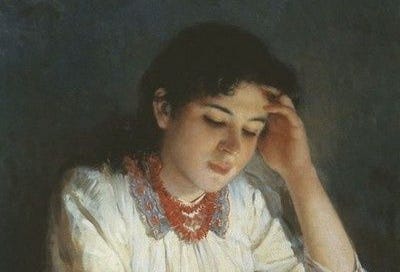


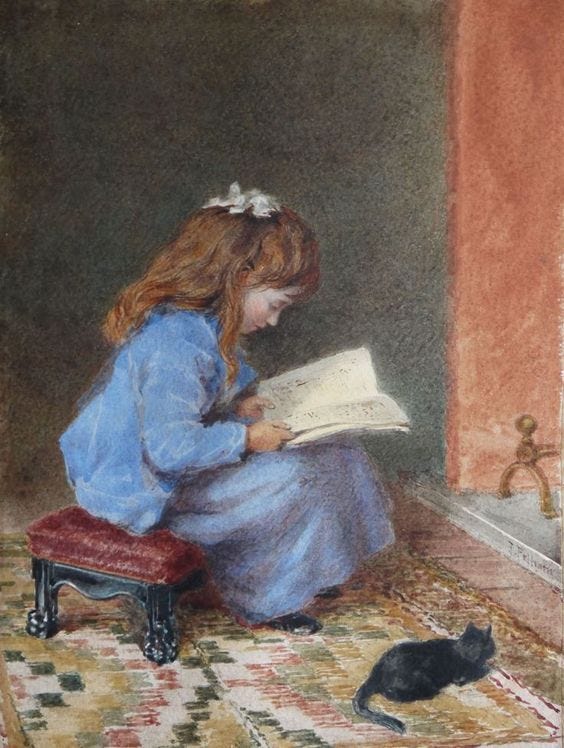
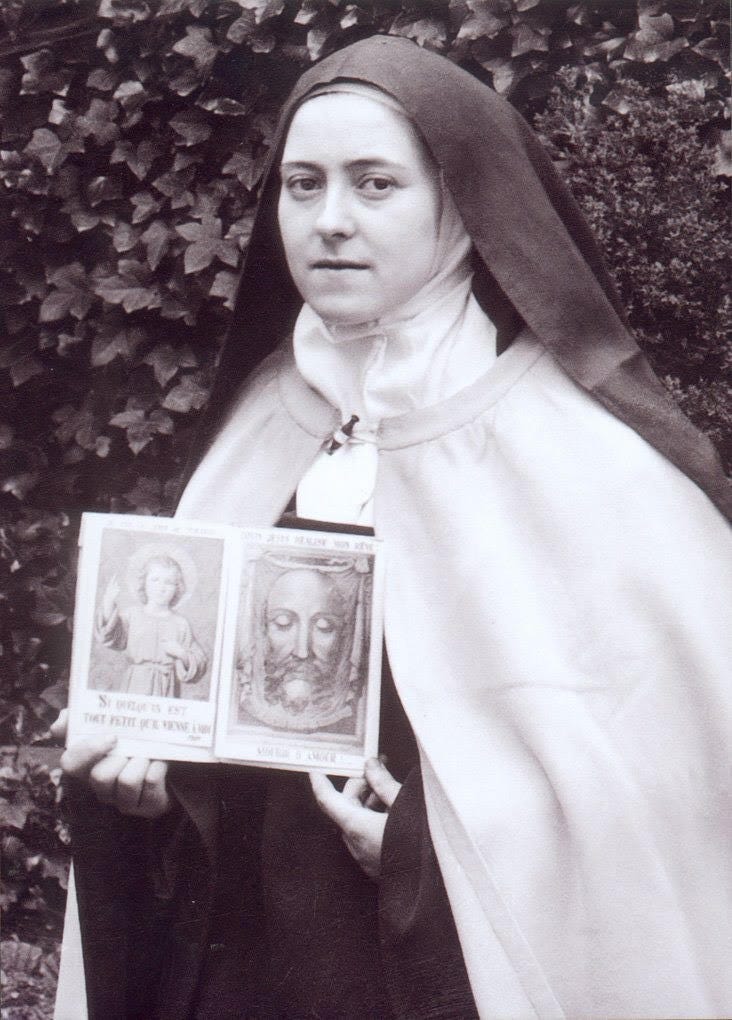

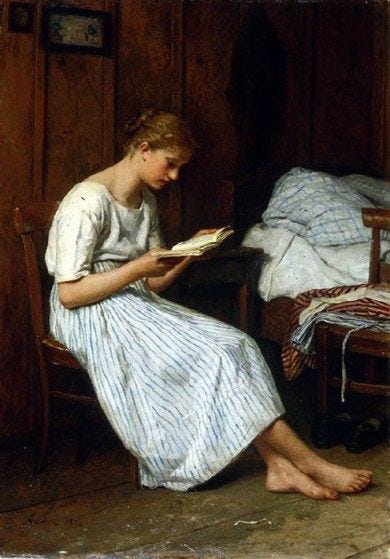
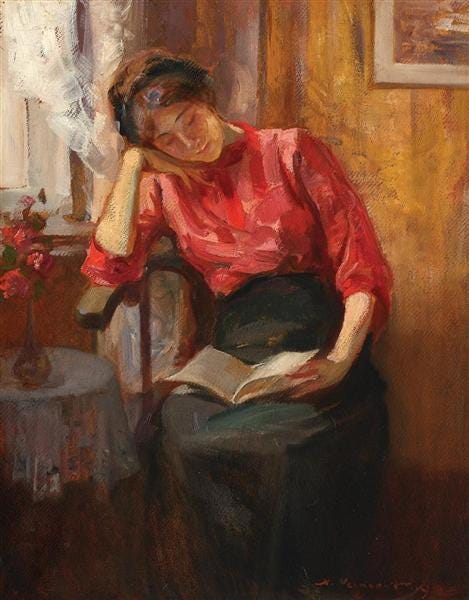
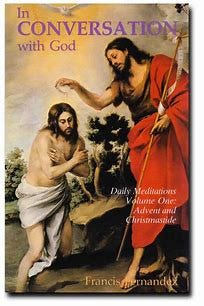
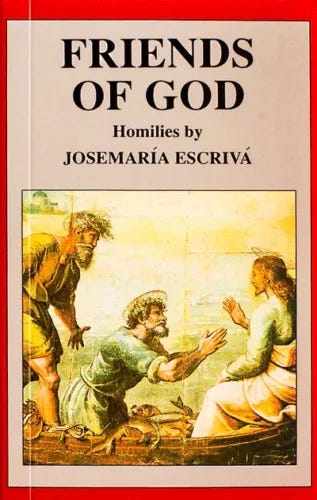
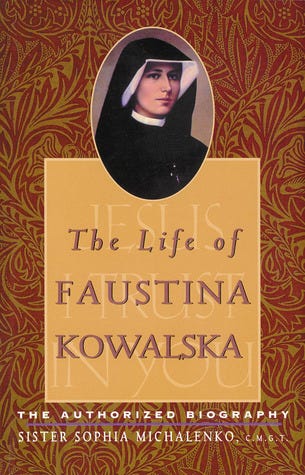

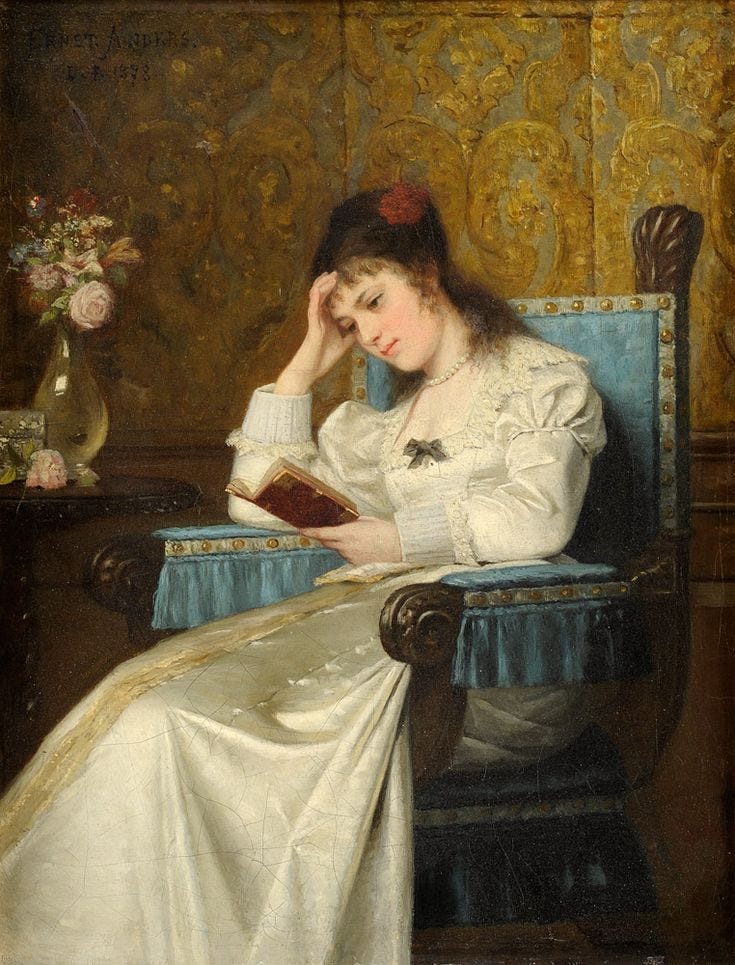

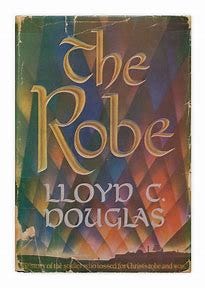

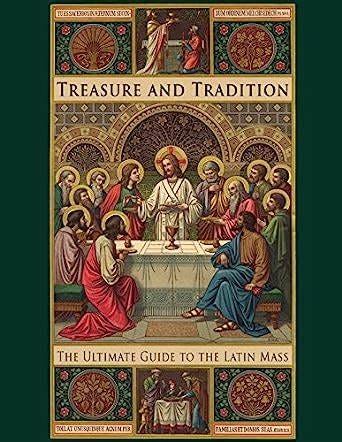

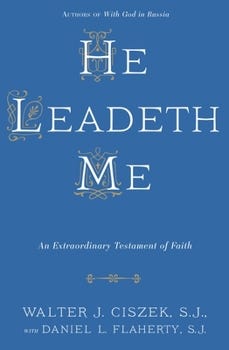

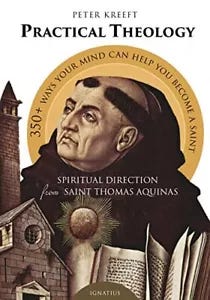

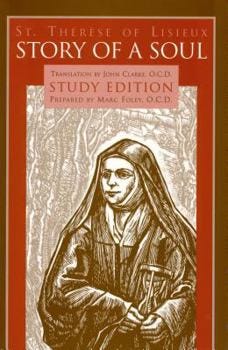


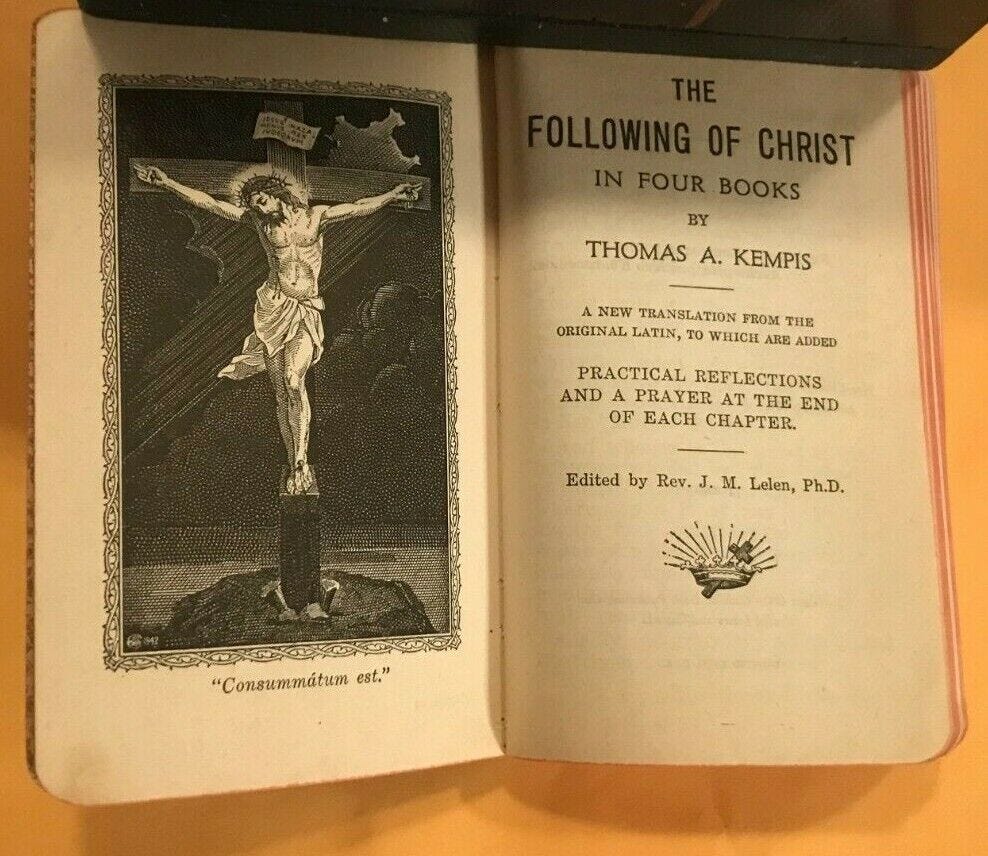
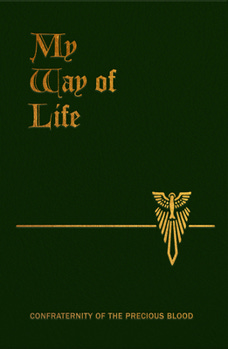


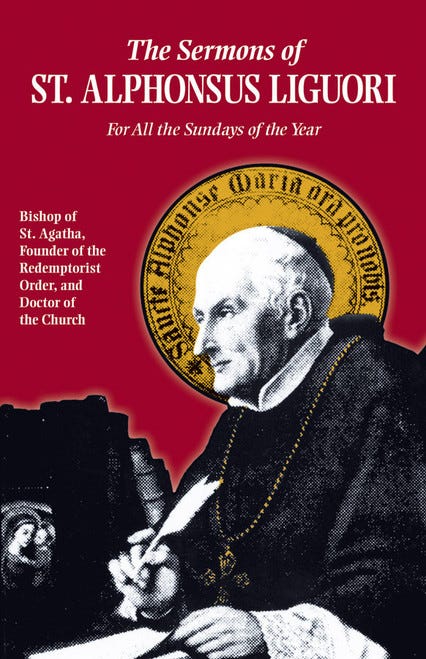


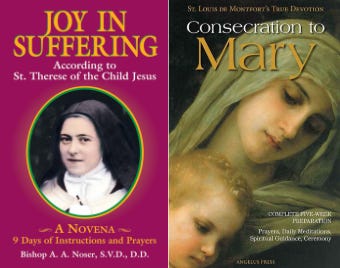

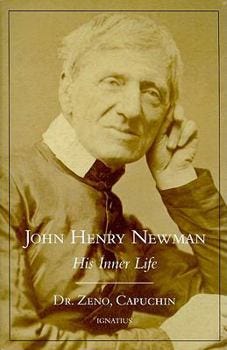
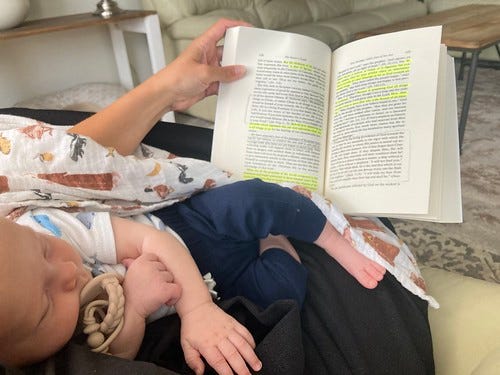

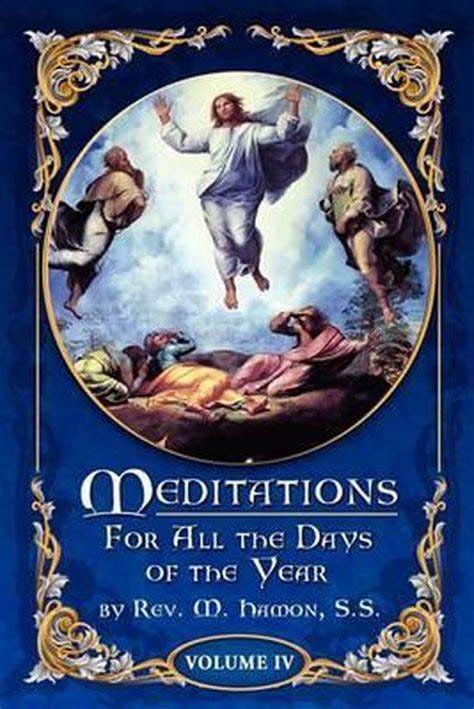
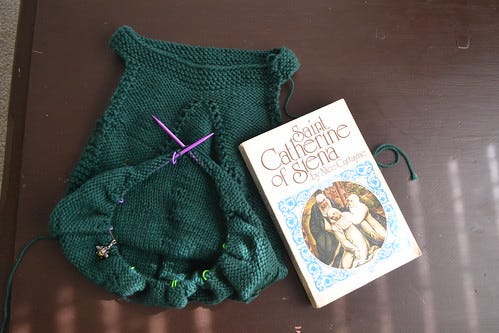
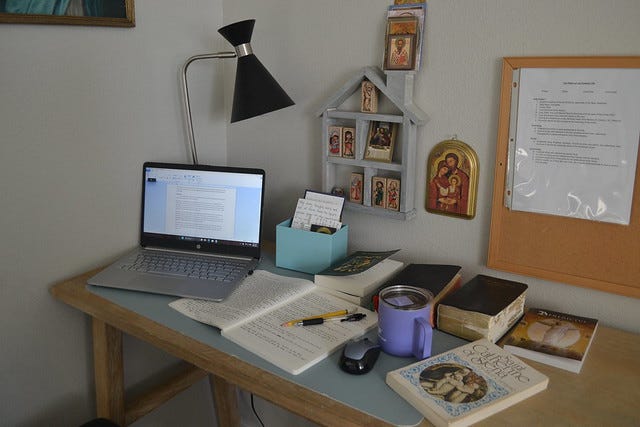

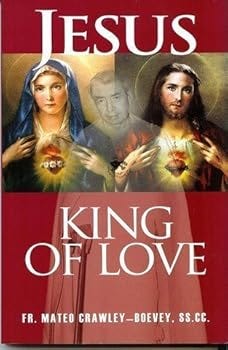
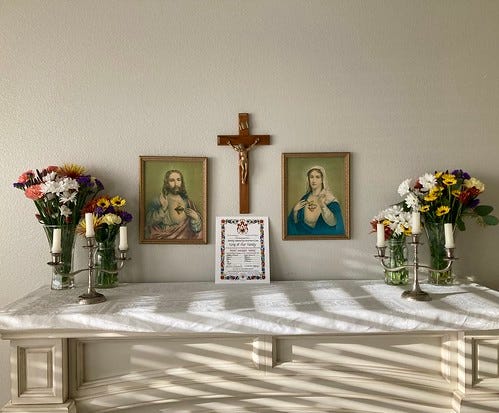

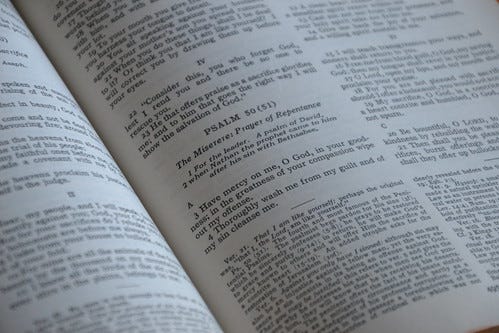

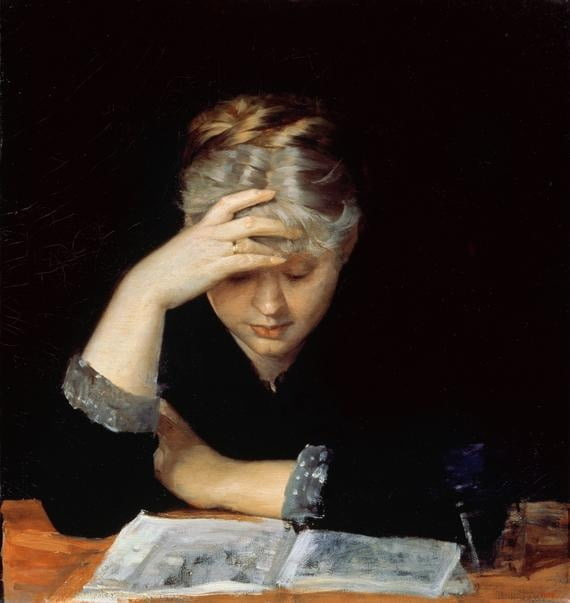
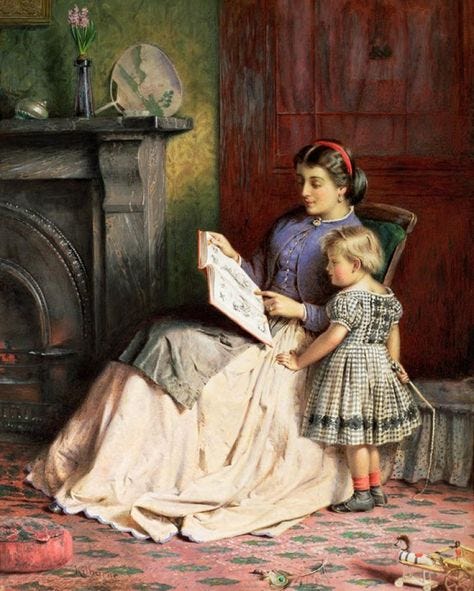
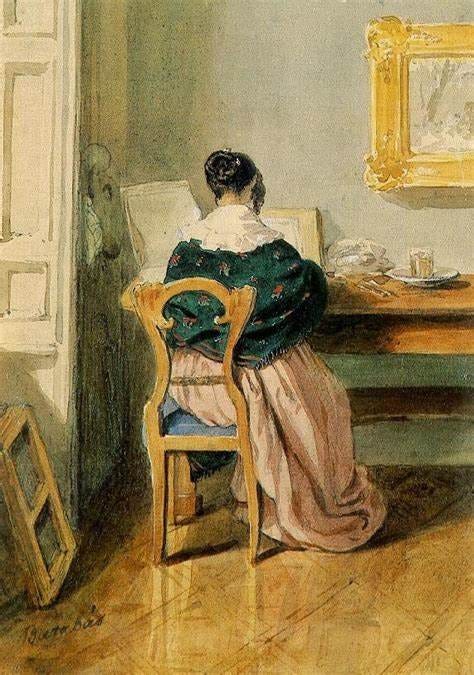
Wow! Good work. Thanks so much for sharing this so beautiful
I see so many parallels here to my spiritual life and reading life. Lots of familiar sentiments! Lots of familiar titles! I have also had my idea of what holiness consists of knocked off of its pedestal. I'm doing a reread of Abandonment to Divine Providence and am being reminded of how holiness consists much in part of faithfully tending to the duties of one's state of life. I'm going to have to print your essay, because it's so lengthy (for me to sit and read it on-line) and ponder it more. One thing that has come under my radar lately is seeing my own imperfections and also having to ask myself why I should be surprised that I sin and remind myself that His grace is sufficient for me, that His power is made perfect in my weakness. I think it's good though, to know of our weaknesses because we need to rely more on Him instead of ourselves and if our weaknesses are what lead us to that, all the better. (I don't pretend I like it, but I know it's for my good.) Oh, and I have to repeat to myself over and over "Jesus I trust in you"- St. Faustina - and - "O Jesus I surrender myself to you, take care of everything." - Father Dolindo Ruotolo Thanks for writing this - and many blessings to you and yours!